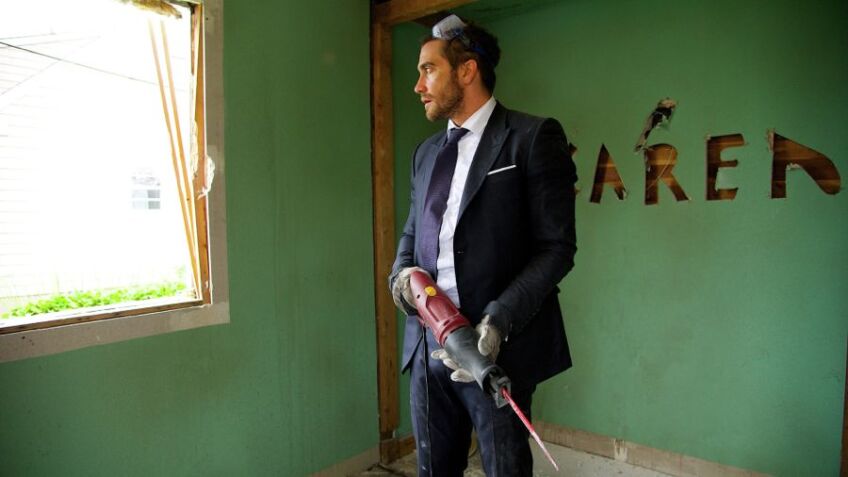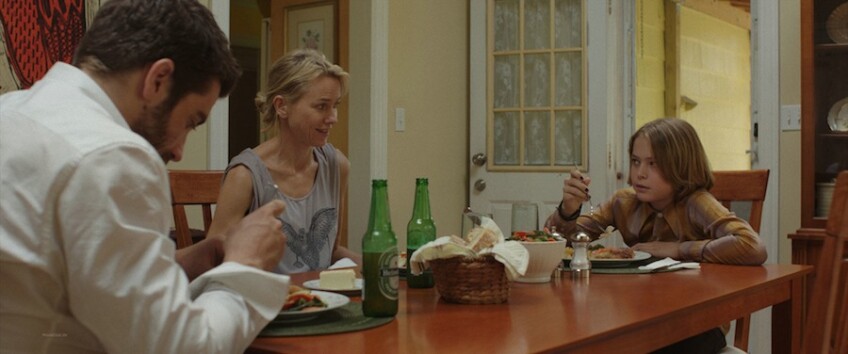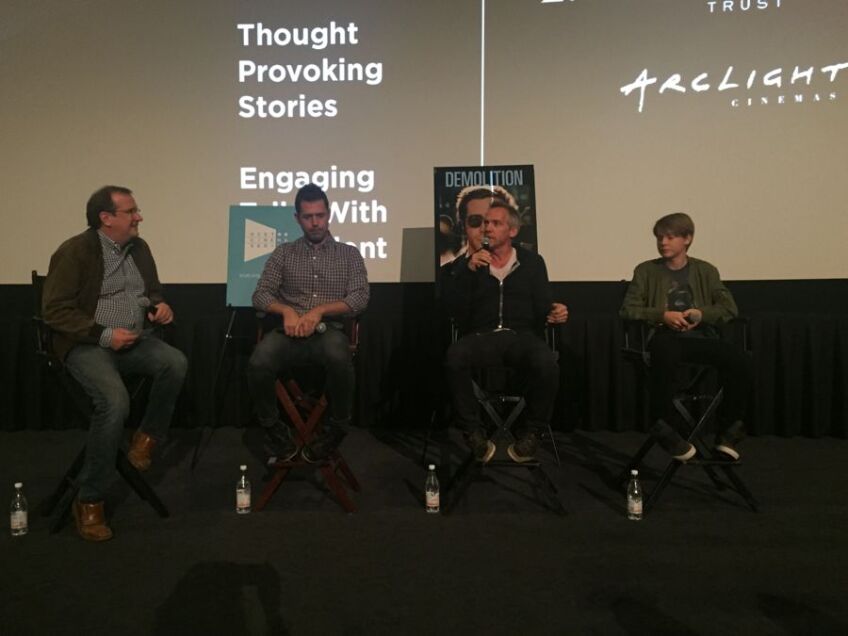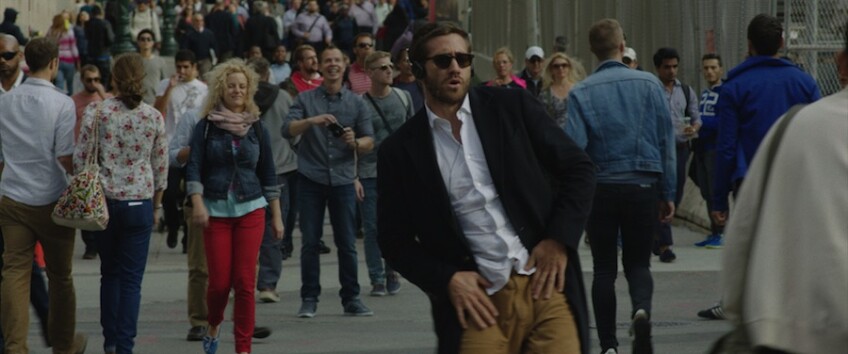Bryan Sipe, Jean-Marc Vallée and Judah Lewis Talk 'Demolition' at KCET Cinema Series


The KCET Cinema Series continued at ArcLight Cinemas Sherman Oaks on Tuesday, April 5, with "Demolition." Jake Gyllenhaal plays an investment banker whose life takes a dramatic turn after the death of his wife. In the process, he develops a friendship with a customer service rep (Naomi Watts) and her rebellious, teenage son, played by Judah Lewis in his film debut.
Lewis was on hand for a Q&A session following the film. Joining him were screenwriter/co-producer Bryan Sipe and director/producer Jean-Marc Vallée ("Dallas Buyers Club"). Pete Hammond, host of the KCET Cinema Series and awards editor/columnist for Deadline Hollywood, led the panel discussion.
The spring KCET Cinema Series is sponsored by E. Hofert Dailey Trust and gives audiences the chance to see new indie films and informative discussions. The eight-week series ends on April 12 with a screening of "The Meddler" from Sony Pictures Classics.
Director Jean-Marc Vallée on what drew him to the script for "Demolition."
Thanks to this guy [Bryan Sipe], who had the courage to write something so unique and special and something so personal. It's funny how I describe it. I like to say it's a script that had a rock n' roll sensibility. When I read it first, it touched me deeply in a very funny way because I laughed out loud. I didn't know where it was going and, at the end, I was crying like a baby and I didn't understand why. I read it again and the same thing happened -- laughed out loud and I cried. I was laughing and crying.
It's funny now, in life, it's when I cry -- when I watch films or read a great book. It's rare, in life, that I cry, although it happens. Normally, it's because it's sad. At the end, I was like, this is not sad. I was crying because it was beautiful and because of the whole journey. Also, I was picturing myself. I got to direct this thing.This is so rare. This is a celebration of cinema. I'm saying rock 'n' roll because "Demolition" is such a title and the theme, it makes noise. Rock 'n' roll is to use loud instruments to make noise and tell your parents that you want to do it your own way, tell the establishment you're going to do it your own way. It's funny how it had this vibe.
Bryan Sipe on his real life inspiration for the film.
This is work that I did when I was a younger man, 17 until I was probably 20, 21, years old. I was swinging a sledgehammer, working for my father, tearing down houses. That was the genesis of this story.
Two things happened, I learned that to figure out how something is put together, you've got to tear it all apart because I don't have a mechanical mind. I don't really understand construction. I don't understand engines, but I could tear walls down and I could smash things. There was something cathartic about that, at first, anyway. And then, what happens after a while is that feeling goes away and then you're just in this dark, dismal, shallow home, what used to be someone's home, thinking "when am I ever going to get out of here?" That was my experience doing that.
Finally, I did get out of there and I moved out here, but I had a very similar experience half a dozen years later when I wasn't where I wanted to be out here. I came out pretty confident that I had stories to tell and people were going to listen to those stories and I was going to have no problem making it in this business, but this business had other things in mind for me.
I wrote some very mediocre to bad scripts. That was really for them. These were the scripts that everybody said were going to sell. This is house money. I never found the house money. I found myself in a place that was very reminiscent of those days when I was doing construction, standing around in these burned out houses surrounded by debris and crawling around on the nails that are going through my feet and inhaling insulation. I stopped caring. I stopped caring about what I was doing out here. I stopped caring about the stuff that he's so passionate about, about art, about music, about reading. I just didn't care anymore and that was where this voice came from. It started very quietly and the more I listened to it, the louder it got. Then I sat down with it and let him go where he wanted to go and this is the journey that he took me on.

Bryan Sipe and Jean-Marc Vallée on "Demolition" star Jake Gyllenhaal.
BS: Jake was probably 14 years old when I started writing this.
It was 10 years in the making.
JMV: We sent it to a lot of actors, all the A-list actors, because we were looking for money. That's the way it works. You find an actor that is on top right there and we send it to all of them. There were seven, eight of them on top there and Jake is just the one that responded viscerally and passionately, just the way I did and we did. He went, "I want to do this badly." I remember the first conversation. I remember when Brian and I were looking for actors and we were looking for actors and Brian said, look at this face, this guy could be a really good Davis Mitchell.
BS: What I thought was interesting was that he hadn't done anything like this. Jake has played these -- his career has really had a resurgence and what I think everybody saw that he was on the rise and hitting his stride again, he did "End of Watch." He did "Prisoners."
Pete Hammond: "Nightcrawler."
BS: Intense cops and this mutant night crawler and a pugilist. We're looking at his picture going, this is so interesting because this is just a man and he hasn't really done that, but he's responding to this material and we really wanted to see him do it and were pretty confident that he could. He proved us right.

Judah Lewis on how he landed the role of Chris in "Demolition."
JL: I originally self-taped, actually, interestingly enough. I got a few notes back and I did that a few times and then, at the end, I Skyped with Jean-Marc and we Skyped for maybe two hours and really worked through the material and talked about the character in the film. One thing was music -- [it] was incredibly important to this film and this character. It's kind of his way of expressing himself. He made a playlist of seven or eight songs, they ranged from rap to rock to, you know, hip-hop, completely contradictory genres of music and he had me dance to them. I remember just completely letting go. You kind of have to because this character feels the music and it's not about the technicality of dancing. It's really about this feeling of completely letting go and really expressing himself.
JMV: He was in L.A. We were in New York and it was the economic way of doing it, instead of flying. In a way, it works. He has a rock star quality. Look at him. I was on Skype and I was like, I hope this kid is a great actor. We just want to put the camera on his face.
He wasn't afraid to do it and he let go, like he said. He ad-libbed some stuff in his backyard. The audition was about acting, dancing and demolishing, wild dancing, and he was trashing some stuff in his backyard, going wild and it was a rock concert.
JL: I think it's safe to say that we needed new trash cans.
On filming the movie's main demolition scene.
JL: It was a real house. They built, like, a wing on the front of it, like an extra room. I mean, that scene is completely real. There's no breakaway glass, no fake countertop. Everything you see me and Jake absolutely crush. I remember, Jean-Marc actually operated the camera on that, slung the camera over his shoulder, and he was kind of running around us in 360. We definitely had marks to hit, but, for the most part, I think it was pretty improved. We were just kind of tearing the house apart.
JMV: The whole film was shot, you know, in that spirit of not using light and being able to shoot 360 degrees in a location.
We asked the team to get out or hide or use just a tiny bit of space so that we can almost use 360 degrees. But, in that case, that was it. We gave them the tools. We were, of course staging -- it's not a documentary -- but it was shot almost like it was a documentary... They had some spots to hit, but, as soon as they had the tools, it took, like, an hour and fifteen minutes and you guys demolished the house.
JL: They were really heavy. I remember I started off with a 14-pounder and at some point, I had to go down to 12. Jean-Marc got a few swings in there too. I remember that.
JMV: It was one take. Once it was demolished, that was it. We had to move to something else.
JL: And that was my first day on set.
I walked on the set and was handed a sledgehammer. That was my introduction.
BS: And he was six inches shorter. I remember talking about, is he even going to be able to lift this thing over his head? Sledgehammers are really heavy, but, he did.

On film Jake Gyllenhaal dancing along crowded New York streets.
JMV: When he walks, we have this shot that we use at different moments, it was a part of this ritual of leaving home, taking the train, leaving the train, walking in the streets of New York and then getting downtown in the Wall Street district...
It's taking place in New York. We wanted New York to be present and I had, I remember, some very great New York films with specific New York shots -- this one was "Midnight Cowboy," "Tootsie" shot. You go on 5th Avenue or Madison and there's a slight angle on the street, like a five degree angle. When you're a little bit higher, you use a telephoto lens. It's like you have a sea of people. We knew we were going to use that shot, but there's a moment at one point he was going to dance to the shot and then dance in the streets of New York. It's because of his character, his taste of music or his love of music, he influences Jake, Davis.
Bryan Sipe on the use of voiceover through letters in the film.
I sort of just stumbled upon a trip because, you know, you become very aware of voice over, especially if you're trying to tell the audience something, but if you have a device like that, there's sort of a backdoor to tell the audience something -- I think it's more forgivable and more lyrical. That's what I stumbled upon and it gave me the ability to be more honest through these letters because he doesn't think anybody is reading them. He suspects that, but he's really revealing his soul here. It ended up becoming the connective tissue of the script and, certainly, the movie. We're able to play around with chronology. We can jump around and find out what he's up to and what he's feeling, create suspense, and always have this direct line right to his brain, what he's feeling in that moment, because we know he's going to be honest.
On a gun-centric scene in the film.
JL: I think there were a lot of conversations. I think it's incredibly relevant right now. I don't think that that scene promotes gun violence. I don't think it's romanticized. There's even a line at the end where Davis says, "OK, now never do that again." That line was incredibly important because it's so relevant in today's world and it's something we see so often.
BS: There was a lot of conversation about that. I think, when it came down to it, we just wanted to be as truthful to what the script was and that this was this scene that sort of makes you really uncomfortable and it wasn't out of character for him to do that. There was some fighting to keep that in, to keep it the way that it was.
JMV: I'm so happy that it's still there because it's truthful to what he is and what he's going through. There is some sort of death wish and this crazy act of giving a gun through a kid and, hey, "why don't we try this bullet vest?" Are you sure this is safe? Of course, it's not. It's crazy. It's crazy and it was important. It was irreverent in a way, but it was important to his journey to realize, "oh my God, what did I just do, with a kid." It's in his process of waking up, doing stupid things and, "thank God, the stupid thing didn't turn out badly." But, we were told "cut that scene, we're going to get so much shit out of it. Cut it out. Cut it out." Well, this is the beauty of his wicked mind and this whole thing and the script.
Why should we have to cut it, because it makes people uncomfortable? Because it goes to a place where it's not really correct? We went, well, alright, let's assume it, let's do it and we'll talk about it and we'll defend ourselves. We're not promoting arms and we're not doing anything like that.


